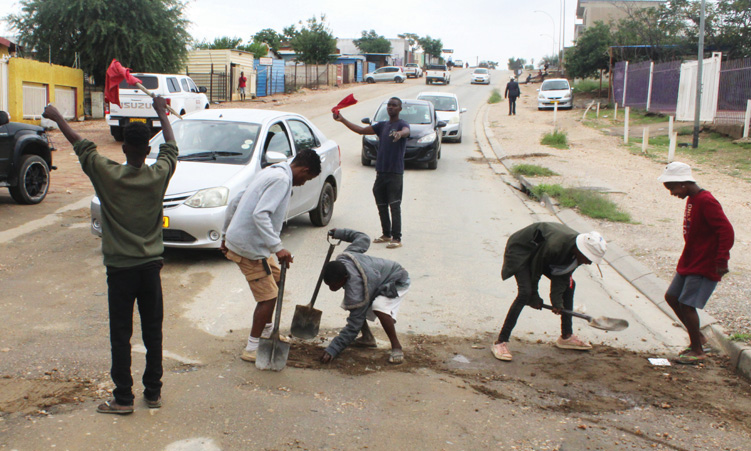COMMUNAL ostrich farmers in the South have given up hope of raising chicks this season after bureaucratic wrangling delayed the release of a N$14 million Cabinet guarantee.
Late last year Cabinet offered surety to the Karas Communal Ostrich Farmers’ Trust (KOFT) subject to certain conditions. The N$14 million was given as part of a restructuring package for the ostrich industry.Agriculture Minister Helmut Angula told Cabinet that Domesticated Ostrich Products (DOP) and the Charney ostrich companies complied with the conditions and that their ostrich production had continued according to a downsizing programme.However, KOFT farmers opted not to follow steps aimed at establishing the industry, Angula told Cabinet.In an interview with The Namibian, Salmaan Jacobs, a KOFT board member, confirmed that at least 14 000 ostriches, with an estimated value of N$32 million, had died in the South because farmers had no access to fodder.Communal farmers lost around 2 700 birds while between 13 000 and 14 000 ostriches in the care of their commercial counterparts died.Jacobs blamed the deaths on internal politics.He said communal farmers had wanted N$2,5 million as operation capital from the loan but this had been rejected by Cabinet on the recommendation of a technical committee that investigated the needs and viability of the ostrich industry.The committee is comprised of representatives of the Ministry of Agriculture, Ministry of Finance, PriceWaterhouseCoopers, Western Trading Corporation and Namdeb.Jacobs said the committee did not understand the industry and had suggested to Cabinet that the communal farmers buy 10-month-old birds from commercial farmers instead of raising one-day-old chicks themselves.When communal farmers refused to buy 10-month-old birds, the committee recommended that Cabinet withhold the money from the farmers, he alleged.He said KOFT had presented their audited annual financial statements and had repaid an earlier N$1,6 million loan.Between November and May last year, the ostrich industry had already lost up to N$20 million because of shifts in the exchange rate and negative market conditions.Jacobs said they had approached Risto Kapenda, the new Chairman of Ostrich Production Namibia, who had promised to assist the communal farmers.However, he said, raising chicks this season was already out for communal farmers.”It seems like we will be losing this season but, come April, we will have some chicks for the communal farmers to raise,” Jacobs said.At present, many communal farmers are also using their camps to keep goats and sheep; others have opted to hunt for jobs further south – in the Rosh Pinah area.Kapenda told the investors’ conference at Keetmanshoop last week that Government would plough more into the ostrich industry through guarantees.The N$14 million was given as part of a restructuring package for the ostrich industry.Agriculture Minister Helmut Angula told Cabinet that Domesticated Ostrich Products (DOP) and the Charney ostrich companies complied with the conditions and that their ostrich production had continued according to a downsizing programme.However, KOFT farmers opted not to follow steps aimed at establishing the industry, Angula told Cabinet.In an interview with The Namibian, Salmaan Jacobs, a KOFT board member, confirmed that at least 14 000 ostriches, with an estimated value of N$32 million, had died in the South because farmers had no access to fodder.Communal farmers lost around 2 700 birds while between 13 000 and 14 000 ostriches in the care of their commercial counterparts died.Jacobs blamed the deaths on internal politics.He said communal farmers had wanted N$2,5 million as operation capital from the loan but this had been rejected by Cabinet on the recommendation of a technical committee that investigated the needs and viability of the ostrich industry.The committee is comprised of representatives of the Ministry of Agriculture, Ministry of Finance, PriceWaterhouseCoopers, Western Trading Corporation and Namdeb.Jacobs said the committee did not understand the industry and had suggested to Cabinet that the communal farmers buy 10-month-old birds from commercial farmers instead of raising one-day-old chicks themselves.When communal farmers refused to buy 10-month-old birds, the committee recommended that Cabinet withhold the money from the farmers, he alleged.He said KOFT had presented their audited annual financial statements and had repaid an earlier N$1,6 million loan.Between November and May last year, the ostrich industry had already lost up to N$20 million because of shifts in the exchange rate and negative market conditions.Jacobs said they had approached Risto Kapenda, the new Chairman of Ostrich Production Namibia, who had promised to assist the communal farmers.However, he said, raising chicks this season was already out for communal farmers.”It seems like we will be losing this season but, come April, we will have some chicks for the communal farmers to raise,” Jacobs said.At present, many communal farmers are also using their camps to keep goats and sheep; others have opted to hunt for jobs further south – in the Rosh Pinah area.Kapenda told the investors’ conference at Keetmanshoop last week that Government would plough more into the ostrich industry through guarantees.
Stay informed with The Namibian – your source for credible journalism. Get in-depth reporting and opinions for
only N$85 a month. Invest in journalism, invest in democracy –
Subscribe Now!










